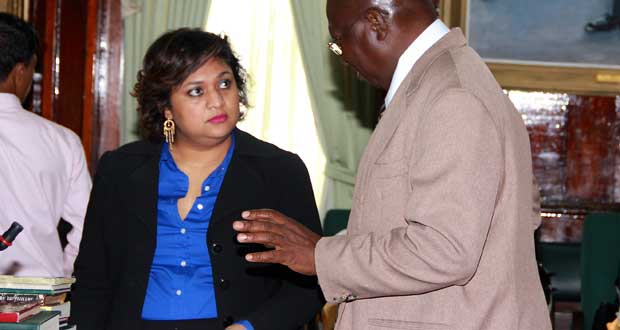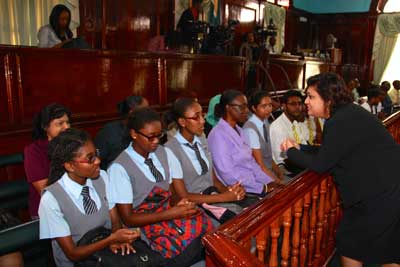Manickchand lays historic Education Bill in National Assembly
– First whole Education Bill since Guyana gained Independence
By Vanessa Narine, June 20, 2014, Source

Education Minister, Dr. Priya Manickchand having a brief word with the Clerk of the National Assembly, Mr. Sherlock Isaacs moments before the Bill was read for the first time
A PROPOSED Education Bill, the first of its kind since Guyana gained independence, according to subject Minister, Dr. Priya Manickchand, was tabled in the National Assembly yesterday, and read for the first time.
The current Education Act being utilised in Guyana came into being since 1876, and was last amended sometime in 1976. The proposed Bill, on the other hand, is intended to repeal the Education Act; reform the legal framework for education in Guyana; and provide an effective system of education related to the needs of the people.

Minister Manickchand stops by to say ‘Hello’ to some St. Stanislaus College students who were at Parliament yesterday
The 126-page Bill includes legislative provisions for several first-time undertakings, and addresses several areas, ranging from administration of the sector, to special-needs education. And with regards to the latter, the Bill outlines the determination of special educational needs, special needs appeals, and the establishment of a council on special education.
SPECIAL-NEEDS EDUCATION
According to the Bill, the Chief Education Officer shall provide a special education programme for any student of compulsory school age, and may provide education for a student beyond that age, who, by virtue of intellectual, communicative, behavioral, physical or multiple attributes or other conditions, is in need of special education.

North Georgetown Secondary’s Headmistress and students at the National Assembly yesterday (Photos courtesy of the Ministry of Education)
It says, “A student who is entitled to a special education programme shall have the programme delivered in the least restrictive and most enabling environment that resources permit, and that is considered practicable by the Chief Education Officer in consultation with the principal and professional staff of the school and the student’s parents, having regard to the educational needs and rights of other students.
“A special education programme may take the form of an individual education plan tailored to the specific or individual needs of the student.”
The proposed legislation further empowers students with special needs, by stipulating that if it is determined that a student will require an individual education plan, then the cost of developing, providing and maintaining the plan shall be split between the parents and the Ministry.
Provision has also been made for the establishment of a Council on Special Education, which will advise the subject Minister on the guidelines for implementing a special education programme.
ADMINISTRATION
In terms of administration, the Bill stipulates that the Minister shall, subject to the resources of the State, ensure that all citizens of Guyana, regardless of age, race, creed, gender, physical or mental ability or socio-economic status, are given the best opportunity to achieve their full potential through equal access to quality education, as defined by the standards and norms outlined by the Ministry. The section dealing with administration also addresses the de-centralised education system of management; the responsibilities and powers of the Education Minister; and the establishment of a National Advisory Committee on Education.

Queen’s College students and their headmistress and Education Officer, Ms. Melcita Bovell who were all present to witness the historic Bill being laid in the House
The Bill specifies that the functions of the Advisory Committee shall be to advise the Minister on: Matters relating to education; matters respecting the discharge of any of the Minister’s responsibilities or the exercising of the Minister’s powers under this Act, as the Minister refers to the Advisory Committee; and on any other matters relating to the promotion of education that the Minister requests advice on from the Advisory Committee.
Several detailed parameters by which private schools should be guided are also mentioned in the Bill.
DECENTRALISED SYSTEM
On the matter of decentralising the education system, the Bill states that the Ministry of Education, headed by the Minister, Permanent Secretary and the Chief Education Officer, has responsibility for:
* National education strategic planning and research;
* Policy formulation and development;
* Resource mobilization;
* Providing centralised services in relation to teacher training and development, facilities of school inspection, curriculum development, text and exercise books, school feeding, administration of examinations, setting of academic and non-academic standards;
* Monitoring and evaluating education delivery and policy implementation; and
* Reporting on the performance of the education system throughout the ten administrative regions, including the Georgetown education district.
With respect to the ten Regional Democratic Councils, they are responsible for the management of the country’s ten administrative regions, except the Georgetown district; and their responsibility extends to the general supervision of education in each region, and to the actual implementation of the education programme through the Regional Education Departments. The Georgetown education district is managed by the Ministry of Education, through a Principal Education Officer.
The Regional Education Departments, according to the Bill, will be directly responsible for the management and supervision of the day-to-day implementation of education in their respective regions, with among their major areas of responsibilities being:
* Management of the delivery of education at the regional level through regular monitoring, supervision and inspection visits to schools;
* Communication of education policies;
* Advising a Regional Democratic Council on education and providing feedback to the Ministry;
* Establishing and maintaining good school and community relationships through the involvement of a Parent Teacher Association in every school;
* Ensuring overall consistency of the regional work plan and school improvement plan with the strategic plan of the Ministry; and
* Ensuring that the non-academic standards are met.
Additionally, the employment of teachers, qualifications of teachers, requirements for employment as a teacher, and the appointment of teachers to public schools, etc., are clearly stipulated in the Bill. The Cyril Potter College of Education (CPCE) is to be governed by this piece of legislation too.
Also, the institution of a national curriculum, guidelines addressing core and foundation subjects, assessment stages, determination of attainment targets and the establishment of subject panels are included.
OTHER AREAS
Another section of the Bill that deals with students’ rights and responsibilities includes the right to education, compulsory education, free tuition at schools, students’ responsibilities, accountability of students, the return of property and the exercise of rights.
Parents’ rights and responsibilities are also dealt with in the Bill and takes into consideration several areas, such as: Choice of education; rights and responsibilities of parents or guardians; student records and reports; Parent Teacher Associations (PTAs); suggestions and wishes of parents to be considered; and school committees.
Other areas are: The admission of students, maintenance of order and discipline in schools, categories of schools and the stages of education and management of public educational institutions and the attendance of students.
Relative to the latter, the Bill says, “It shall be the duty of the parents or guardians of a child of compulsory school age to cause the child to regularly and punctually attend school unless the child is excused from school attendance as prescribed by the regulations. The parent or guardian of a child of compulsory school age who wishes the child to be exempt from compulsory school attendance may apply for a certificate of exemption from attendance.”
Additionally, provisions addressing distance learning and continuing and adult education are also included.
Monitoring, evaluation, reporting and development in the sector and the purpose of monitoring, evaluation, reporting and development also form and important part of the Bill – all in the interest of providing an adequate frameworks for the delivery of high quality, contemporary education, to better develop each student’s potential and maximise their educational achievement.
The move to draft a new Education Bill to adequately address the modern education issues and challenges currently experienced by the sector began in 2005. The Bill tabled in the House reflects information gleaned by the Ministry through a number of public consultations held countrywide between the Ministry of Education and all key stakeholders.
NB: Please put in a box in corner of page:
* Provides for modern education system and to meet needs of students of all ages and abilities
* Caters for de-centralised education system of management
* Mandates establishment of National Advisory Committee on Education
* Provides for the establishment of a Council on Special Education
* Regularises the operations of private schools which must now have permit, be registered, comply with standards.
* Prescribes severe penalties for assault and abuse of teachers by parents and students
* Makes education compulsory from nursery to secondary.
